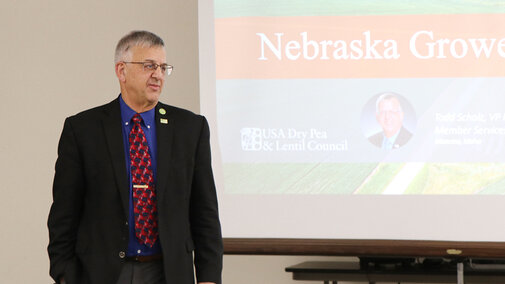Dry pea growers in Nebraska had some good news in November when the U.S. Department of Agriculture (USDA) made upgrades and expanded revenue protection to spring smooth green or yellow type of dry peas in Nebraska.
“We heard recently, after several years, Nebraska growers are now eligible for revenue-based crop insurance for their dry peas,” said Todd Scholz, vice president of research and members services of the USA Dry Pea and Lentil Council.
USDA’s Risk Management Agency (RMA) expansion will begin with the crop year 2024 in select counties of five states, including Nebraska.
“It’s a pretty big deal,” Scholz said. “The growers will have yield protection and security on revenue.”
Scholz added getting the expansion took a lot of work and cooperation from growers to processors and the University of Nebraska-Lincoln’s extension specialists. The groups collected information about peas, lentils and chickpeas in Nebraska. USDA required 10-15 years of yield information on the chickpeas, which came from processors and UNL.
Scholz delivered this news at the 2023 Nebraska Pulse Crops Conference hosted by the Nebraska Extension on Nov. 20 in Bridgeport. He also talked with the growers about some of the projects the USA Dry Pea and Lentil Council is working on to better the market for pulse growers.
The USDA Dietary Guidelines Committee is considering changing the plate (guidelines) for 2025. Something that hasn’t been done since 2010. The council has a coalition called the Coalition for the Advancement of Pulses that is working on increasing the dietary guidelines from 1.5 cups per week to three cups of pulses. Scholz said originally, the guideline had been at three cups, but was changed.
“There was no scientific evidence to take it to a lower value,” he said. “They (USDA) just said no one was eating pulses, so it wouldn’t matter.”
The Coalition has funded scientific studies, where they found if you increase the pulses allocation, you would increase the nutrients of iron and fiber.
“This is important not because people personally follow the guidelines but because the dietary guidelines are the basis for all sorts of federal feeding programs and health advice from different health organizations,” Scholz said.
The increase would also call for more pulse crops to be grown.
The 2023 Nebraska Pulse Crops Conference in November focused on field peas, chickpeas, black-eyed peas and other pulses. The conference included sessions on agronomy and breeding of peas, soil nutrient management, diseases, nutrition and quality for human foods, trade, crop insurance and policy.

